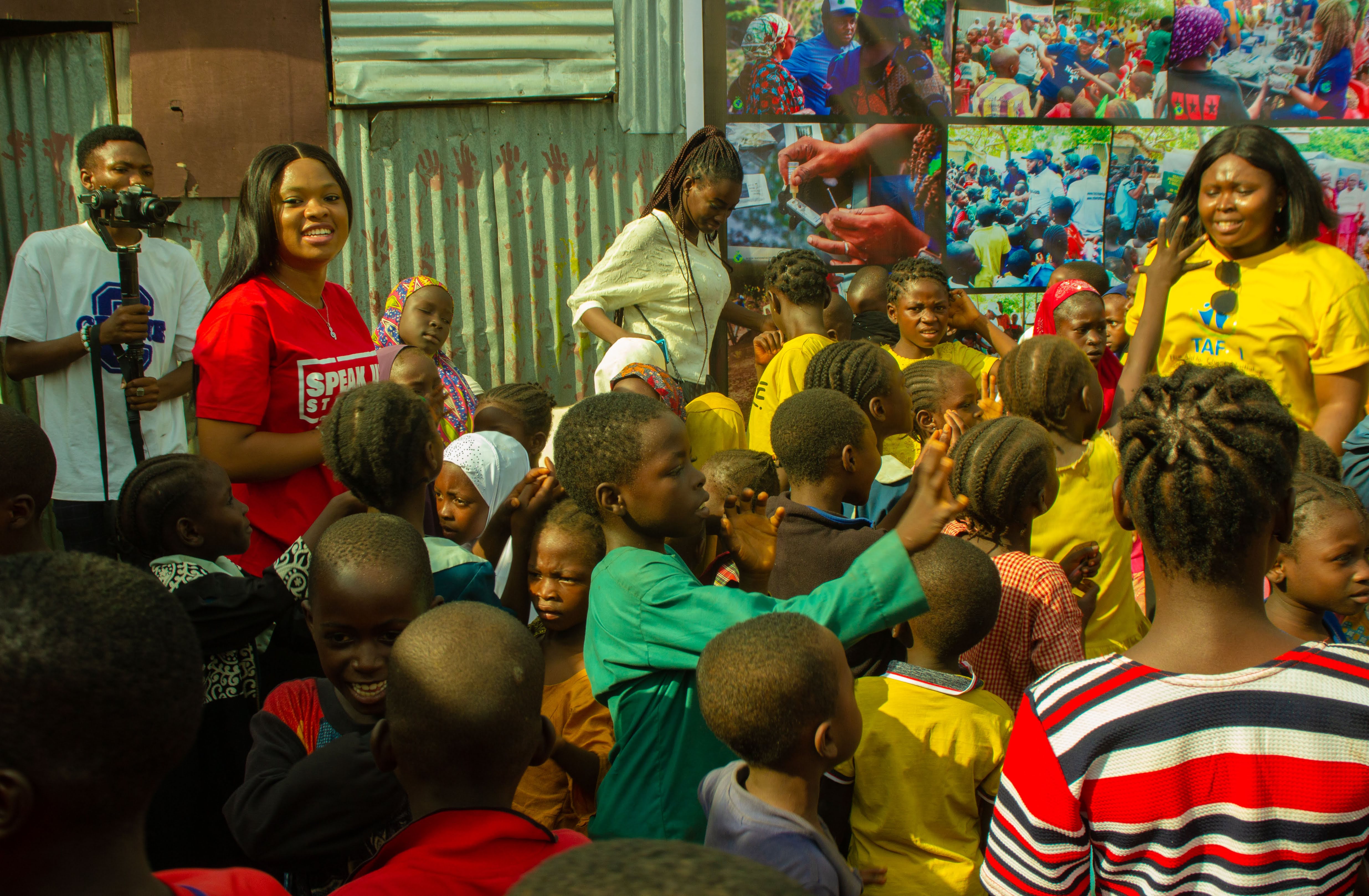
Meet Barr. Ene, a Young Activist Promoting Reconciliation, and Healing as a Tool to Building Peace
In April 2014, a bomb exploded at a bus stop in Nyanya, leaving 18 people dead. Eight years later, the aftermath of that terrible incident left the Nyanya community filled with fear, resentment and anger. Some miles away from the Nyanya community are children from the Kuje IDP Camp, an internally displaced place; these children and families have escaped their homes because of insecurity. Having experienced terrible incidents in their country, these two communities still live in fear of what will happen next and anger because they feel their government has neglected them.
Barr. Ene Mary Audu, a Speak Up Stand Out (SUSO) activist working in the Peace & Security thematic area, visited these two communities and, instead of rejection, read what she did that made the two communities welcome her and her peace-building tool.
“You can discuss with aggrieved people without helping them overcome their trauma, distress, and fears...” That is the essence of this project. The feedback has been good. Most are now open to it. Most are healed. They now talk about their stories.

Tell us about your project on the SUSO project. Why that project? What aspect of the SDGs are you focusing on, and what are your end goals?
With my thematic focus, my project is 'Introducing the concept of reconciliation and healing as a tool to building peace, hope, and trust for the nation.' In our country, the concept of reconciliation, forgiveness, and healing is being ignored in the peacebuilding area. For effective peacebuilding and bringing them together, there is a need to address the trauma of the people and forgiveness moving forward. However, it is possible to eliminate hate, anger, and resentment. But with this step, it would be reduced.
I experienced people's trauma and hatred in the first project I handled. But it was easy to progress from there when I accessed them. "You can discuss with aggrieved people without helping them overcome their trauma, distress, and fears." That is the essence of this project.
The feedback has been good. Victims, survivors, family, and friends have testified it is good. Most are now open to it. Most are healed. They now talk about their stories. They participate actively in the engagement.

I am focused on Goal 16 – Peace, Justice & Strong Institutions, and Goal 17 – Partnership for the Goals. I am focused on 16 & 17 because, for 16, the theory of reconciliation, forgiveness, and healing alongside a sound justice system will aid in promoting peacebuilding in the community. "Justice alone cannot guarantee to heal; cannot guarantee the fact that a person overcomes their trauma; cannot guarantee forgiveness. But these concepts alongside a good justice system will promote a good justice system." For Goal 17, the truth is that it is needed in every area. It links one goal to other aspects of the global goals.
In our country, the concept of reconciliation, forgiveness, and healing is being ignored in the peacebuilding area. For effective peacebuilding and bringing them together, there is a need to address the trauma of the people and forgiveness moving forward.
What has changed since you started your project?
People are becoming more open about the healing powers of forgiveness and reconciliation and how it helps in peacebuilding. People are now more open to reconciliation and participating in activities geared towards peacebuilding. It was not a common area. But now it has gained a certain area of popularity.

Tell us how the project has transformed you and those who worked with you on the project.
It has transformed me in so many ways. Thanks to SUSO. I would say the program has helped me to find my purpose and my passion. I have realised that peacebuilding is one aspect we must take seriously in our community and lives. Because without peace, nothing moves forward. My project aids and promotes peacebuilding. It is part of who I am, even beyond the SUSO program. It is something I will continue to promote after now. Now my friends and family have nicknamed me (laughs).
It has aided me personally. I am now a better person than I was. Because I can't discuss reconciliation, healing, and forgiveness with people if I have not practiced the concept within me, it has changed me. It has also changed the people I've worked with. Because you can see the passion, they work with – my volunteers and advocates. People become eager and willing to participate when they hear about the topic. I have gotten beautiful feedback from the people I have worked with. People give feedback on how the project has made them better people.
I am now a better person than I was. Because I can't discuss reconciliation, healing, and forgiveness with people if I have not practiced the concept within me, it has changed me.
What are you learning that would be important for all stakeholders (government, communities, civil societies, individuals) to take note of?
One thing I have learnt from this project that is important for government, individuals, and CSOs…is essential. I am emphasizing it. "You cannot discuss peacebuilding with individuals who haven't healed; who are still battling trauma; who are nursing hate and unforgiveness. It is not possible." I have visited friends, family, and communities and discussed with them. The question they ask is: 'What peace?' At some point, mentioning peace to them even becomes difficult. It is crucial to introduce healing because they have lost a lot of things.

This topic should be embraced and made topmost in peacebuilding. Rehabilitation is introduced into the system for victims and survivors, and counselling programs. Programs that will aid healing and overcoming trauma be introduced. They cannot regain all, but they can settle a bit. When this is achieved, these individuals would now lead the peace-building process. It is beautiful to see these individuals discuss peace-building themselves.
As the focus is on rehabilitating offenders, emphasis should also be made on victims & survivors. There should be a focus on the two aspects. If the focus is only on the offenders, the victims and survivors get more hurt and will be unwilling to change.
"You cannot discuss peacebuilding with individuals who haven't healed; who are still battling trauma; who are nursing hate and unforgiveness. It is not possible."
What is the sustainability plan for this project? What happens after the Speak Out Stand Project ends?
People are beginning to be aware. Some CSOs are already working in this line. The government should be more open to this concept. Policymakers and peacebuilding advocates should introduce counselling into programs. I have been offering counselling and rehabilitation programs to a limited community which will continue after the SUSO project. There will be a need for more contribution in the area.

In addition, I have screenshots to send or verbally tell you that victims of insecurity have openly told me that this is a concept they have never experienced before, that it has helped me, and that it has enabled them to embrace healing. A bomb blast survivor revealed how the project has been able to help him tell his story, which he had never done, and he met other survivors and felt encouraged. Others have also given good reports of what the program has done for them – it reminded them that they are not only; they are not forgotten and ignored.
I met a lady who hates herself because of the scars on her body. During one of our projects, we featured her. She appreciated us. She said she now feels more confident in herself than before, although not the same as before the incident happened. She reports that she is more open to healing.

Comments
No Comment available!